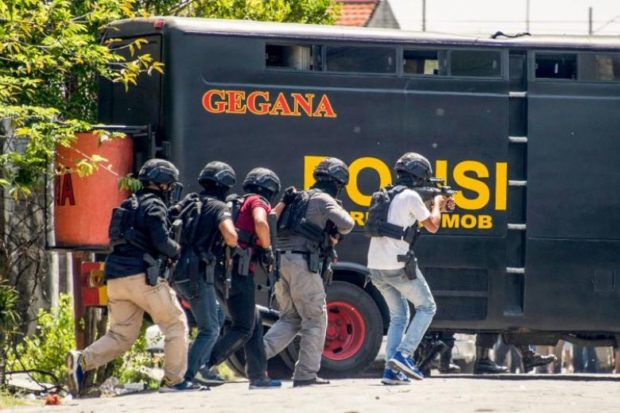110 suspects arrested in connection with Surabaya bombings

Members of Indonesia’s Densus 88 counter-terror police squad conduct a raid on the residence where a family suspected of taking part in recent suicide bombings resided in, in Surabaya, on May 15, 2018. AFP
JAKARTA — Investigations into last month’s Surabaya suicide bombings have led to the arrest of 110 suspects, as Indonesian police move to unravel the terrorist network behind the attacks.
“All 110 suspects are linked to each other,” national police chief Tito Karnavian told reporters on Friday (June 15) at the Bogor presidential palace, after attending the Eid al-Firtri open house by President Joko Widodo.
He declined to reveal details regarding the connections between the suspects and the perpetrators of the triple-church bombings and the attack at the Surabaya police headquarters on May 13 and 14, as operations are still ongoing.
“It is also the peak of our security operations, and ensuring security is our religious duty,” said General Tito.
Most of the suspects were nabbed in East Java, including the five men arrested on June 13 with a plan to attack local police stations and banks. Some were also picked up in Central Java.
Article continues after this advertisementAmong evidence seized during the arrests were a firearm with bullets, as well as books on jihad and other radical doctrine, said General Tito.
Article continues after this advertisementThe attacks in Surabaya last month claimed 27 lives, including 13 perpetrators who are said to have been in sleeper cells with ties to the Jemaah Ansharut Daulah, a local terrorist group loyal to the Islamic State in Iraq and Syria (ISIS).
The coordinated attacks and traces of military-grade explosives found at the blast sites suggest a rising level of tactical capability among Indonesian terrorists.
But it was the fact that the militants were willing to use their wives and children as cover for suicide bombings that shocked the nation.
The wide terrorist network uncovered by police in East Java has also raised concerns over the rise of extremism in the province. The presence of Islamic militants in East Java, however, is not new.
Ali Imron, Amrozi and Mukhlas – three brothers belonging to Jemaah Islamiah (JI), and involved in the 2002 Bali bombings – used to live in Lamongan, a sleepy town about 50km from Surabaya, the capital of East Java.
More recently in 2015, two sisters-in-law from Lamongan were deported from Turkey with their children after trying to enter ISIS-controlled territory in Syria. At the time, the Jakarta-based Institute for Policy Analysis of Conflict said Lamongan’s extremist community was shaped by the JI, with many of its attacks hatched and planned in the area.
Before it was dismantled by counter-terrorism police in Indonesia, the JI, just like the JAD today, had also provided recruiters, fighters and propagandists for ISIS.
Indonesian police will remain on high alert during the Eid al-Fitri holidays and in the weeks ahead with regional polls, including one to elect the governor of East Java, set to take place on June 27.
Security is also expected to be tight at the sentencing of JAD leader Aman Abdurrahman next Friday at a Jakarta court.
He was charged for inciting other militants to commit various terror attacks in Indonesia, including an attack in Jakarta in 2016 that left four bystanders dead.
Prosecutors are seeking the death sentence for the radical Indonesian cleric, who is also believed to have had a hand in the creation of the Surabaya sleeper cells.
Aman had previously preached in Surabaya, and his teachings often describe democracy as “syirik”, or idolatry, and argued that Muslims have a duty to free themselves from the system and attack instruments of the state such as the police.